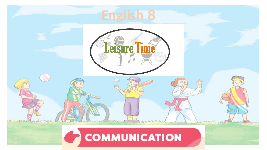



















Preview text:
Hello everyone !!! English 8
Uni 1 COMMUNICATION IN THE t 0 FUTURE LESSON 4: COMMUNICATION 1 * WARM- Ask and answer. UP
Question: How do you see you in 10 years?
Answer: I will _________________. Your future
Hold on. Can you repeat that, please? * EVERYDAY ENGLISH
1 Listen and read the conversations below. Pay attention to the highlighted parts.
Mark: Now, about the video conference ...
Everyone must be here at 9:30 a.m., and ...
1 Trang: Sorry for interrupting, but I think we
should meet at 9:00 a.m. We need to test the devices.
Nick: This webcam is easy to handle. You
click these buttons to move it up or down 2 and these to ...
Lan: Hold on. Can you repeat that, please? Structure Examples How to interrupt politely Sorry for interrupting, but Hold on. * EVERYDAY ENGLISH
2 Work in pairs. Make similar conversations with the following situations.
1. Student A is telling student B how to make a
video call. Student B interrupts student A to ask for clarification.
2. Student A is telling student B the place for
their next meeting. Student B interrupts student A to suggest another place. * EVERYDAY ENGLISH
2 Work in pairs. Make similar conversations with the following situations.
1. Student A is telling student B how to make a
video call. Student B interrupts student A to ask for clarification. * Example:
A: First, you open Facetime application on your laptop. And then you select
from your contacter or you type their phone number ...
B: I'm sorry, I didn't catch that. Can you repeat, please? * EVERYDAY ENGLISH
2 Work in pairs. Make similar conversations with the following situations.
2. Student A is telling student B the place for
their next meeting. Student B interrupts student A to suggest another place. * Example:
A: Well, the meeting is 9 a.m tomorrow morning. We
will hold a meeting in Communication room which is in floor ...
B: Sorry for interupting, but that room this occupied by
the other class. We can hold a meeting in Room 401. THE FUTURE OF LANGUAGE
Work in pairs. Read Mark’s prediction about a popular means of
3 communication in the near future. Then ask and answer the questions.
Mark: In 20 years, people of all ages will be using emojis even
more than now. Emojis help people communicate their
emotions effectively regardless of the language they speak. For
example, a smiley face expresses the same meaning
everywhere. An emoji can replace words to a certain extent.
One day, we might receive an email that contains only emojis!
Work in pairs. Read Mark’s prediction about a popular means of
3 communication in the near future. Then ask and answer the questions.
1. What means of communication is Mark talking about?
2. When will emojis become more commonly used?
3. Who will be using them?
4. How will they help in communication?
5. Why will they become more popular? Game Game Gift box secret game
1. What means of communication is Mark talking about? Emojis You are given 3 GO candies HOME
2. When will emojis become more commonly used? In 20 years You are GO given 2 HOM candies E
3. Who will be using them? People of all ages You are given 10 mark GO HOME
4. How will they help in communication?
Emojis help people communicate their attitudes effectively
regardless of the language they speak. You are given 5k GO HOME
5. Why will they become more popular?
Because an emoji can replace words to a certain extent. You are given 5k GO HOME
Work in pairs. Read Mark’s prediction about a popular means of
3 communication in the near future. Then ask and answer the questions.
1. What means of communication is Mark talking about? Emojis
2. When will emojis become more commonly used? In 20 years
3. Who will be using them? People of all ages
4. How will they help in communication?
Emojis help people communicate their attitudes effectively
regardless of the language they speak.
5. Why will they become more popular?
Because an emoji can replace words to a certain extent. THE FUTURE OF LANGUAGE
Work in pairs. Choose one means of communication below. Ask and answer 4 questions about it. 2. Chatbot
1. Automatic translation function – When: in 10 years – When: in 10 years
– Who: sellers of online shops – Who: social network users
– How: instantly reply to customers in
– How: translate comments and all languages
private messages in all languages
– Why: help sell more products to
– Why: remove language barriers
customers from other countries PRODUCTION
Report your pair’s conversation to the class by making a similar talk to
5 Mark’s prediction in 3.
Mark: In 20 years, people of all ages will be using emojis even
more than now. Emojis help people communicate their
emotions effectively regardless of the language they speak. For
example, a smiley face expresses the same meaning
everywhere. An emoji can replace words to a certain extent.
One day, we might receive an email that contains only emojis! * CONSOLIDATION
What have we learnt in this lesson? • How to interrupt politely • The future of language - Do exercise in WB
- Prepare the next lesson: Unit 10- Skills 1.




